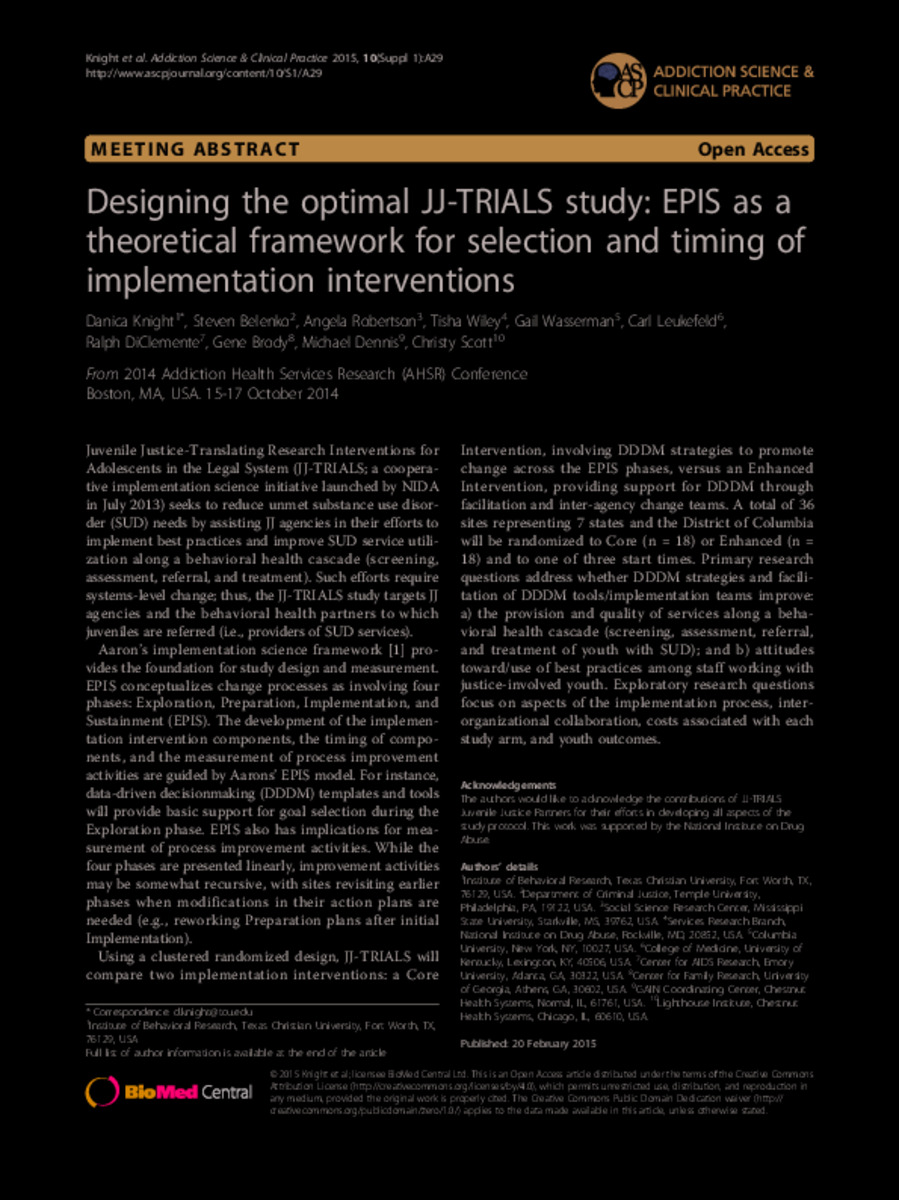Designing the optimal JJ-TRIALS study: EPIS as a theoretical framework for selection and timing of implementation interventionsShow full item record
| Title | Designing the optimal JJ-TRIALS study: EPIS as a theoretical framework for selection and timing of implementation interventions |
|---|---|
| Author | Knight, Danica K.; Belenko, Steven; Robertson, Angela A.; Wiley, Tisha R. A.; Wasserman, Gail A.; Leukefeld, Carl G.; DiClemente, Ralph J.; Brody, Gene H.; Dennis, Michael L.; Scott, Christy K. |
| Date | 2015 |
| Abstract | Juvenile Justice-Translating Research Interventions for Adolescents in the Legal System (JJ-TRIALS; a cooperative implementation science initiative launched by NIDA in July 2013) seeks to reduce unmet substance use disorder (SUD) needs by assisting JJ agencies in their efforts to implement best practices and improve SUD service utilization along a behavioral health cascade (screening, assessment, referral, and treatment). Such efforts require systems-level change; thus, the JJ-TRIALS study targets JJ agencies and the behavioral health partners to which juveniles are referred (i.e., providers of SUD services).; ; Aaron’s implementation science framework [1] provides the foundation for study design and measurement. EPIS conceptualizes change processes as involving four phases: Exploration, Preparation, Implementation, and Sustainment (EPIS). The development of the implementation intervention components, the timing of components, and the measurement of process improvement activities are guided by Aarons’ EPIS model. For instance, data-driven decisionmaking (DDDM) templates and tools will provide basic support for goal selection during the Exploration phase. EPIS also has implications for measurement of process improvement activities. While the four phases are presented linearly, improvement activities may be somewhat recursive, with sites revisiting earlier phases when modifications in their action plans are needed (e.g., reworking Preparation plans after initial Implementation).; ; Using a clustered randomized design, JJ-TRIALS will compare two implementation interventions: a Core Intervention, involving DDDM strategies to promote change across the EPIS phases, versus an Enhanced Intervention, providing support for DDDM through facilitation and inter-agency change teams. A total of 36 sites representing 7 states and the District of Columbia will be randomized to Core (n = 18) or Enhanced (n = 18) and to one of three start times. Primary research questions address whether DDDM strategies and facilitation of DDDM tools/implementation teams improve: a) the provision and quality of services along a behavioral health cascade (screening, assessment, referral, and treatment of youth with SUD); and b) attitudes toward/use of best practices among staff working with justice-involved youth. Exploratory research questions focus on aspects of the implementation process, inter-organizational collaboration, costs associated with each study arm, and youth outcomes. |
| Link | https://doi.org/10.1186/1940-0640-10-s1-a29
https://repository.tcu.edu/handle/116099117/56563 |
| Department | Institute of Behavioral Research |
| Subject | Health psychology
Psychology Nursing Social work Best practice Process management Psychological intervention Referral Primary research Process (engineering) Exploratory research |
Files in this item
This item appears in the following Collection(s)
- Research Publications [898]
Related items
Showing a few items related by title, author, creator and subject.
-
"There’s an app for that" — A novel tool to help community correction populations learn strategies to decrease HIV risk behaviors after release.
Gray, Julie; Pankow, Jennifer; Lehman, Wayne E.; Rowan, Grace A.; Knight, Kevin (2015)During the first 5 years of the Disease Risk Reduction Project, an in-prison intervention curriculum was developed and tested that focused on decreasing risky sexual and drug use behaviors after release. The WaySafe ... -
Diversity of Adjustments to Reward Downshifts in Vertebrates
Papini, Mauricio R. (2014)This review focuses on reward-schedule effects, a family of learning phenomena involving surprising devaluations in reward quality or quantity (as in incentive contrast), and reward omissions (as in appetitive extinction), ... -
Influence of Victim and Perpetrators’ Alcohol Use on Social Work Student’s Levels of Rape Myth Acceptance
Baldwin-White, Adrienne; Elias-Lambert, Nada (2017)Rape myths are stereotyped, false cultural values that serve to justify sexual assault against women. This study examined the perceptions of alcohol use on levels of rape myth acceptance among social work students. One ...
© TCU Library 2015 | Contact Special Collections |
HTML Sitemap






